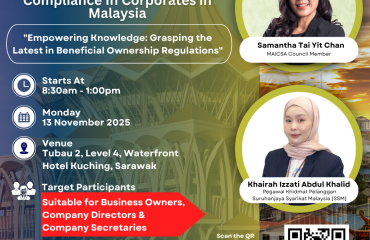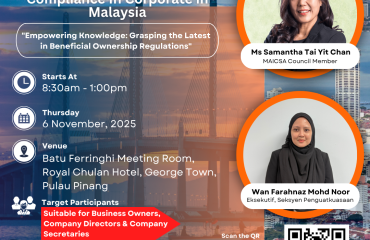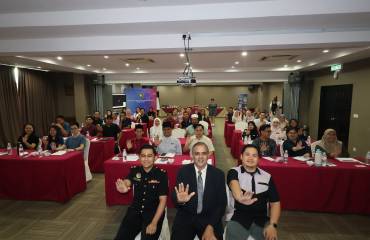
Transparency International – Malaysia (TI-M) concurs the result of a study undertaken by Transparency International UK’s Defence and Security Programme (TI-DSP) finds that two-thirds of parliaments and legislatures around the world fail to exercise sufficient control over their Ministry of Defence and the armed forces, and 70 per cent of these largest arms importers in 2012 leave the door open to corruption. TI-DSP analysed 82 countries on the authority, ability and attitude of parliaments and legislatures play their vital role in reduce corruption risks in the defence sector.
Each country was analysed using a comprehensive survey of 19 indicators / questions from the original 77 indicators used in the Government Defence Anti-Corruption Index (GI) 2013 and by supplementing the scores with qualitative analysis from updated GI assessments. In this report, TI-DSP also identified seven (7) key areas in which parliaments may reduce corruption, namely (a) Budget Oversight & Debate; (b) Budget Transparency; (c) External Audit; (d) Policy Oversight & Debate; (e) Secret Budgets Oversight, (f) Intelligence Services Oversight; and (g) Procurement Oversight.
The sad part is that Malaysia is, in fact, ranked with a score of 25.14 out of 100.00 per cent in a 6-band rank which exhibit “Very High” risk of corruption amongst 21 other countries. The countries are Afghanistan, Bahrain, Bangladesh, Belarus, China, Ethiopia, Iraq, Jordan, Morocco, Nigeria, Oman, Palestine, Pakistan, Rwanda, Singapore, Tunisia, United Arab Emirates, Uzbekistan, Venezuela and Zimbabwe. Malaysia’s band ranking went from “D” – High to “E” – Very High!
In the local scene, a total of RM23 billion has been allocated for defence and security under the 10th Malaysian Plan while, in contrast, the savings from the latest withdrawal of subsidies due to RON95 Petrol and diesel by 20 cents a litre, the government will save RM1.1 billion for the rest of the year and RM3.3 billion next full year. There is always a high risk for corruption in the defence sector because the amount of money involved in contracts is enormous, which can allow corrupt individuals to hide money in these contracts.
There are needs to be more transparency so that citizens know how their tax money is being spent. We think defence establishments can be leaders in integrity and openness, providing an example by leadership to implement integrity pacts for other institutions and sectors within the country. PEMANDU should introduce integrity pacts in the defence procurement as one of NKRA on Corruption.
TI-M is concerned that the lack of transparency in the procurement practices would lead to the purchase of outdated military equipment at a very high cost. This could cost them their lives, when there is a war or incident such as that which happened in Lahad Datu, Sabah. In order to achieve greater transparency with the purchase of defence equipment, the Ministry of Defence should go for open tenders, instead of direct negotiations with certain parties.
Therefore, it is time for Members of Parliament from both sides of the political divide to further strengthen their oversight of the country’s defence budget and focus on tightening the procurement of defence equipment.
Hence, TI-M urges the parliamentarians from both the ruling party and the Opposition to push for greater transparency and set aside the Official Secrets Act (OSA) 1972 and introducing the Freedom of Information Act. Information should be made available to the parliamentarians who will then be able to debate over the defence budget and monitor the procurement process to prevent a similar embarrassment suffered by Prime Minister, Najib Abdul Razak’s administration. TI-M also calls on parliamentarians to establish cross-party committees and groups of external experts to empower their scrutiny and inform their debate of defence matters.
It is noteworthy that countries like Australia, Germany, Norway and United Kingdom which are known for their military superiority can be ranked amongst the lowest in corruption risks. This is a case where political will and the integrity of the Government, rather than national security, are in question. There is, therefore, no reason why the OSA should be used to hide details of military procurement from the legislative oversight.
TI-M would also urge Najib’s administration to submit annual budget, including the defence budget, to parliament for its debate, consideration and approval. A report on the budget’s implementation must be presented to parliament within five months following the approval of budget. For example, Japan’s defence expenditure is audited by the strictly independent board of audit. The Japanese constitution requires the Board to audit the final accounts of the expenditures and revenues of the state on an annual basis. These audit reports are then submitted to parliament (The National Diet) during the fiscal year immediately following the period covered.
END.
Note:
1. In “Watchdogs?” Transparency International’s defence team identified seven areas in which parliaments may reduce corruption in defence:
- Budget oversight & debate
- Budget transparency
- External audit
- Policy oversight & debate
- Secret budgets oversight
- Intelligence services oversight
- Procurement oversight
2. The seven areas identified by the team were analysed by cutting the data from 19 of the indicators used in the GI 2013, and by supplementing the scores with qualitative analysis from the GI assessments, updated appropriately. The report contains 19 country case studies to highlight specific good practice. It also makes clear recommendations, and proposes practical tools, by which this good practice can be replicated in other countries.
3. Transparency International UK’s Defence and Security Programme helps to build integrity and reduce corruption in defence and security establishments worldwide through supporting counter corruption reform in nations, raising integrity in arms transfers, and influencing policy in defence and security. To achieve this, the programme works with governments, defence companies, multilateral organisations and civil society. The programme is led by Transparency International UK (TI-UK) on behalf of the TI movement. For more information about the programme please visit www.ti-defence.org.







